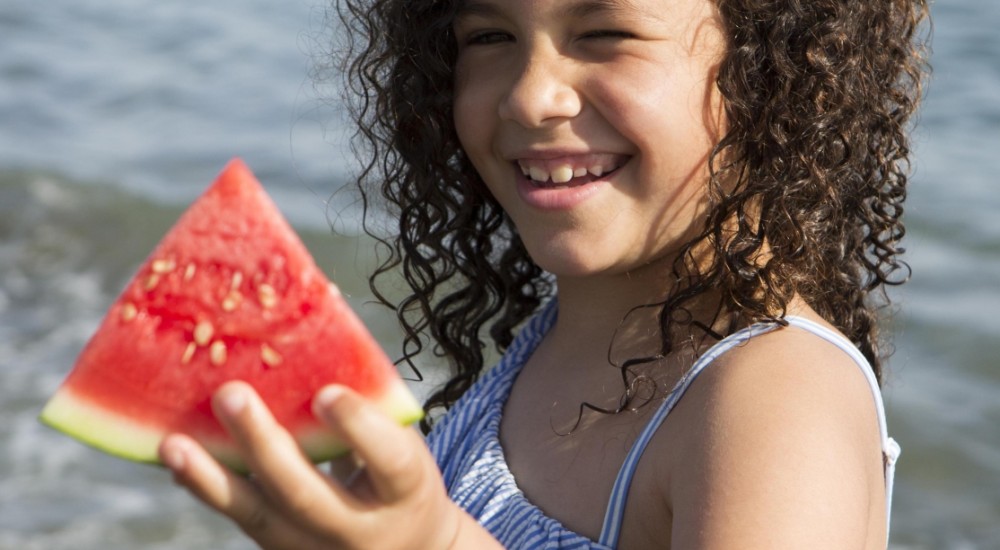
* Reposted with permission from The Dalai Lama Center.
Summer is a feast for the senses. For many, summer is synonymous with hot, sun drenched days and long bright evenings; gritty sand and slippery sunscreen; sweet lemonade and smoky barbeques. For some, the sensations of summer are tolerable, if not enjoyable: the cool breeze from a fan or air conditioner feels refreshing. A trickle of watermelon juice down the chin is little more than a sticky inconvenience. For some children, however, the sensations of summer are overwhelming.
According to Lindsay Biel and Nancy Peske, authors of Raising a Sensory Smart Child, children with sensory processing challenges often find it difficult to transition between calm and alert states. Parents and caregivers can prevent and manage sensory overwhelm by learning coping skills that balance children’s Secure & Calm and Alert & Engaged Heart-Mind Qualities. Read on to learn how to help kids find their sweet spot when it comes to sensory stimulation and summer fun!
Sensory Regulation Tips for Summer
According to Raising a Sensory Smart Child: The Definitive Handbook for Helping Your Child with Sensory Processing Issues, children with sensory processing challenges need a healthy “sensory diet” in order to regulate well. This means that they need to engage in a variety of activities that provide the right types of sensory input throughout the day. Doing so helps their nervous system stay balanced and organized. For this reason, the best way to prevent summertime sensory distress is to develop a consistent routine of helpful sensory activities.
However, even the best sensory diet can’t ward off all potential dysregulation. Once you’ve completed this checklist to identify your child’s sensory sensitivities, take a look at the following list of ideas for avoiding and/or troubleshooting common summertime triggers, inspired by Raising a Sensory Smart Child.
Sunscreen: Children who are sensitive to light touch may prefer a stick sunscreen that they can help apply themselves. Similarly, children who can’t stand the slimy feel of lotion sunscreen may better tolerate a spray. Those who tend to seek out different textures may actually enjoy helping rub lotion sunscreen onto their bodies, finding the sensory input it provides calming.
Sand: Many children who are hyposensitive to touch sensations find walking barefoot on sand or smooth stones calming. For children who struggle with the feeling of sand between their toes, wearing socks or closed toe shoes to the beach may be a preferable alternative. These children may also feel more comfortable sitting in a folding chair or on a beach mat that is easy to wipe clean than on a towel or blanket.
Air conditioning/fans: Children who are sensitive to light touch may find the sensation of air blowing on their skin intolerable. Plan ahead and pack or dress your child in light long-sleeved tops and pants, and even a fabric headband or hat to cover their ears, if you expect to be in an environment where fans or A/C are likely. Children who are hyposensitive to light touch may find standing in front of a fan or A/C unit soothing, especially on a hot day. Doing so is one strategy that may help these children ward off a potential meltdown, particularly if they are stuck inside to avoid the heat.
Swimming: For a child who is on the hyposensitive side, swimming and water play in general provide a wealth of sensory input that can be deeply regulating. In the extreme, highly sensory seeking children may gravitate towards water in ways that may be unsafe, so parents and caregivers should be prepared to monitor them closely. Children who are on the hypersensitive side may require extra support to feel comfortable in the water. Test-drive swim wear both wet and dry at home and consider goggles, ear plugs, nose clips, and or swim caps if water on and around the face is an issue.
Car rides: With travel restrictions beginning to lift in many places, road trips may once again be possible for some families. Children who are motion sensitive may get carsick easily. These children may benefit from wearing acupressure wrist bands or drinking and eating foods that contain ginger. For children who are sensitive to background noise, listening to an audiobook or music with noise cancelling headphones may help block out the rumbling of streets or highways. Sensory seeking children may find being stuck inside a car terribly understimulating. Travel with juice boxes and crunchy snacks for oral sensory input, a weighted lap pad, and fidget toys or silly putty to help these children feel calmer while on the road.
Sticky foods: Who doesn't love juicy watermelon, melty popsicles, and saucy burgers straight off the barbeque? Some children with a sensitivity to sticky or slimy touch sensations may find it challenging to enjoy these summer foods. Dice up juicy summer fruits to eat with a spoon, fruit salad style, or freeze them into home made posicle molds with a lip at the bottom to catch drips. Offer burgers and hotdogs "disassembled" and cut into bite sized pieces for dipping using a fork. Keep baby wipes on hand when eating outside for quick relief from sticky spills. Children who are sensory seeking may particularly love eating foods that involve getting messy! For these kids, outdoor dining may give them (and their parents) the freedom they crave to enjoy these foods without worrying about a big clean up afterwards.
For more information on tips and strategies to help children feel more comfortable with their senses, visit our new sensory processing challenges page to learn more.







